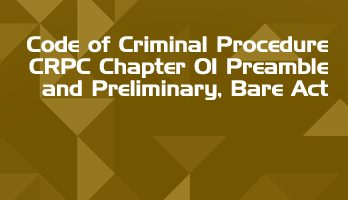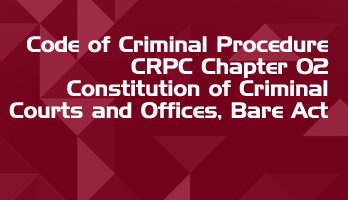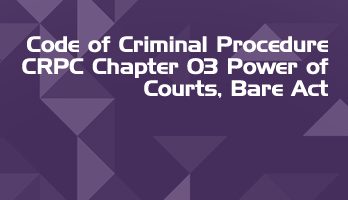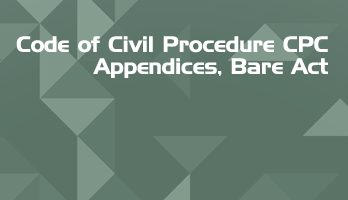A 'Bare act' is the actual legislation passed by the Parliament of India. Generally, an act sets out the high level legal and policy principles applicable to the subject matter of the law.
Most acts are accompanied by 'subsidiary legislation' such as rules, regulations, notifications and orders; which address the actual implementation detail of the act.
Free Full Course Available on LawMint's YouTube Channel
How to Land Your Dream LLB Internship in a Top Law Firm
- Part 1 - Introduction
- Part 2 - Internship Planning
- Part 3 - Internship Research
- Part 4 - Building Your Profile
- Part 5 - The Email
- Part 6 - The Resume
- Part 7 - The Cover Letter
- Part 8 - The Interview
- Part 9 - Self Development
Practical and comprehensive course, with real examples and step-by-step analysis of the complete internship application process. Check out LawMint's YouTube channel now!
Code of Criminal Procedure, 1973
Chapter 20 – Trial Of Summons – Cases By Magistrates
Section 251 – Substance of accusation to be stated
When in a summons – case the accused appears or is brought before the Magistrate, the particulars of the offence of which he is accused shall be stated to him, and he shall be asked whether he pleads guilty or has any defence to make, but it shall not be necessary to frame a formal charge.
Section 252 – Conviction on plea of guilty
If the accused pleads guilty, the Magistrate shall record the plea as nearly as possible in the words used by the accused and may, in his discretion convict him thereon.
Section 253 – Conviction on plea of guilty in absence of accused in petty cases
- Where a summons has been issued under section 206 and the accused desires to plead guilty to the charge without appearing before the Magistrate, he shall transmit to the Magistrate, by post or by messenger, a letter containing his plea and also the amount of fine specified in the summons.
- The Magistrate may, in his discretion, convict in his accused in his absence, on his plea of guilty and sentence him to pay the fine specified in the summons, and the amount transmitted by the accused shall be adjusted towards that fine, or where a pleader authorised by the accused in this behalf pleads guilty on behalf of the accused, the Magistrate shall record the plea as nearly as possible in the words used by the pleader and may, in his discretion, convict the accused on such plea and sentence him as aforesaid.
Section 254 – Procedure when not convicted
- If the Magistrate does not convict the accused under section 252 or section 253, the Magistrate shall proceed to hear the prosecution and take all such evidence as may be produced in support of the prosecution, and also to hear the accused and take all such evidence as he produces in his defence.
- The Magistrate may, if he thinks fit, on the application of the prosecution or the accused, issue a summons to any witness directing him to attend or to produce any document or other thing.
- A Magistrate may, before summoning any witness on such application, require that the reasonable expenses of the witness incurred in attending for the purposes of the trial be deposited in Court.
Section 255 – Acquittal or conviction
- If the Magistrate, upon taking the evidence referred to in section 254 and such further evidence, if any, as he may, of his own motion, cause to be produced, finds the accused not guilt, he shall record an order of acquittal.
- Where the Magistrate does not proceed in accordance with the provisions of section 325 or section 360, he shall, if he finds the accused guilty, pass sentence upon him according to law.
- A Magistrate may, under section 252 or section 255, convict the accused of any offence triable under this Chapter which form the facts admitted or proved he appears to have committed, whatever may be the nature of the complaint or summons, if the Magistrate is satisfied that the accused would not be prejudiced thereby.
Section 256 – Non – appearance or death of complainant
- If the summons has been issued on complaint and on the day appointed for the appearance of the accused, or any day subsequent thereto to which the hearing may be adjourned, the complainant does not appear, the Magistrate shall notwithstanding anything hereinbefore contained, acquit the accused unless for some reason he thinks it proper to adjourn the hearing of the case to some other day: Provided that where the complainant is represented by a pleader or by the officer conducting the prosecution or where the Magistrate is of opinion that the personal attendance of the complainant is not necessary, the Magistrate may dispense with his attendance and proceed with the case.
- The provisions of Sub – Section (1) shall, so far as may be, apply also to cases where the non – appearance of the complainant is due to his death.
Section 257 – Withdrawal of complaint
If a complainant, at any time before a final order is passed in any case under this Chapter, satisfies the Magistrate that there are sufficient grounds for permitting him to withdraw his complaint against the accused, or if there be more than one accused, against all or any of them, the Magistrate may permit him to withdraw the same, and shall thereupon acquit the accused against whom the complaint is so withdrawn.
Section 258 – Power to stop proceedings in certain cases
In any summons – case instituted otherwise than upon complaint, a Magistrate of the first class or, with the previous sanction of the Chief Judicial Magistrate, any other Judicial Magistrate, may, for reasons to be recorded by him, stop the proceedings at any stage without pronouncing any judgment and where such stoppage of proceedings is made after the evidence of the principal witnesses has been recorded, pronounce a judgment of acquittal, and in any other case release, the accused, and such release shall have the effect of discharge.
Section 259 – Power of Court to convert summons – cases into warrant cases
When in the course of the trial of a summons – case relating to an offence punishable with imprisonment for a term exceeding six months, it appears to the Magistrate that in the interests of justice, the offence should be tried in accordance with the procedure for the trial of warrant – cases, such Magistrate may proceed to re – hear the case in the manner provided by this Code for the trial of warrant – cases and may recall any witness who may have been examined.
Important Central Acts in Regional Languages
Legislative department website also features regional language versions of several important Central Acts.
Free Full Course Available on LawMint's YouTube Channel
How to Land Your Dream LLB Internship in a Top Law Firm
- Part 1 - Introduction
- Part 2 - Internship Planning
- Part 3 - Internship Research
- Part 4 - Building Your Profile
- Part 5 - The Email
- Part 6 - The Resume
- Part 7 - The Cover Letter
- Part 8 - The Interview
- Part 9 - Self Development
Practical and comprehensive course, with real examples and step-by-step analysis of the complete internship application process. Check out LawMint's YouTube channel now!












